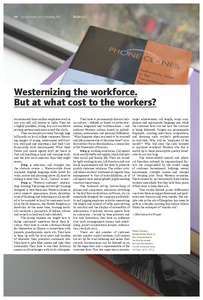Westernizing the workforce. But at what cost to the workers? [Book review - Phone clones: authenticity work in the transnational service economy]

2013
07
44
call centre ; customer service ; international relocation of industry ; outsourcing ; trade union document
Service sector
English
" An estimated three million employees work in 700 000-odd call centres in India. They are a highly-qualified, young, low-cost workforce serving western customers round-the-clock.
They are mainly recruited through huge billboards on local college campuses blazon¬ing images of young, westernized self-starters, well-paid and enjoying a laid-back California-style work environment. What these future call centre agents don't yet know is that call handling is hard and wearing work, and the jobs more insecure than they might seem...
Step 1: selection, and straight into the obstacle course ... Western-style dress required; English language skills tested for voice, accent and phrasing; above all, must be willing to shed their "local", "Indian" accent.
Step 2: "Western customer" relationship training. The young recruits get training designed to turn them into Western clones in every respect: appearance, dress, identities, ways of thinking and behaving are all mould¬ed to be accepted as local by customers located in North America, the United Kingdom or Australia. At the same time, training methods inculcate a perception of Indian culture and society as backward and outdated.
The young trainees are taught how to dodge customers' questions about their location. They have to create a fictional family for themselves in Illinois or somewhere with parents, grandparents, aunts, etc. They have to keep up with the local news and weather of wherever their potential customers live. They have to give false names and hide their nationality. They have to use their fictitious names in all exchanges with work colleagues.
They have to permanently disown Indian culture – defined as based on authoritarianism, religiosity and traditionalism – and embrace Western culture, based on individualism, materialism and personal fulfilment. "What happens when you need to be yourself and like someone else at the same time?" wonders author Kiran Mirchandani, a researcher at the University of Toronto.
Step 3: working conditions. Call agents work mostly shifts and nights, which disrupts their social and family life. They are bound by tight working hours, call duration and rest break requirements and the need to preserve quality customer relations. The author actually likens workers' treatment as regards time management to that of schoolchildren, as if call agents were undisciplined pupils needing constant supervision.
The technical set-up (networking of phones and computers, automatic switching to the first free workstation, software, etc.) is essentially designed for company profitability and logging employee activity: measuring the length and content of calls; pace-setting by autodial and the display of screenfulls of information. Customer service agents have no autonomy – bound by time pressure and low task discretion, they have no influence over work arrangements (times, task scheduling, preset conversation scripts, information overload, etc.).
There are any number of customer service quality control systems. Call centres are set up for dual listening and hence dual control: conversations can be listened-in on by the supervisor and a representative of the customer firm. This lets supervisors monitor target achievement, call length, script compliance and appropriate language use, while the customer firm can see how the contract is being delivered. Targets are permanently displayed, creating inter-team competition, and showing each worker's performance in real-time. Who will be "employee of the month"? Who will reap the cash bonuses or purchase vouchers? Workers who fail to match up to these prescriptive quality standards do not last long.
The stress-related mental and physical disorders induced by organizational factors are compounded by the varied range of customer harassment: bullying, sexual harassment, outright racism and charges of "stealing jobs" from Western countries. These abuses do not necessarily leave Indian workers unscathed. But they hold their peace if they want to keep their job.
This totally skewed power differential can drive these young professionals and graduates into burnout and even suicide. The suicide rate in the city of Bangalore has risen by 40% in a decade, earning this Indian Silicon Valley the sobriquet of "suicide city". — Marianne De Troyer"
Digital;Paper
See also
-
[Book]
Phone clones: authenticity work in the transnational service economy
/ 1.
ILR Press, 2012. - 174 p.
ISBN 978-0-8014-7767-6
-
[Article]
Formater des travailleurs à l'occidentale. Pour quel coût humain ? [Book review - Phone clones: authenticity work in the transnational service economy]
/ 1.
HesaMag, 2013, n° 07. - 52
The ETUI is co-funded by the European Union. Views and opinions expressed are however those of the author(s) only and do not necessarily reflect those of the European Union or the ETUI.